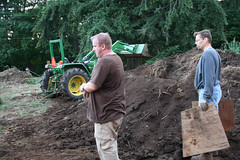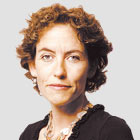It is very hard for the average person in the street to come to a sensible conclusion on peak oil. It's a subject that prompts a passionate polarisation of views. The peak oilists sometimes sound like those extraordinary Christians with sandwich boards proclaiming that the end of the world is nigh. In contrast, the the international economic establishment – including the International Energy Agency (IEA) – has one very clear purpose in mind at all times: don't panic. Their mission seems to be focused on keeping jittery markets calm.
Faced with these options the majority of people shrug their shoulders in confusion and ignore the trickle of whistleblowers, industry insiders and careful analysts who have been warning of the imminent decline in oil for over a decade now.
Remember the Queen's question – that uncannily accurate and strikingly obvious question she put to economists at the London School of Economics a year ago after the financial crisis: did no one see it coming? Apply that question to peak oil and the answer is that many people did see it coming but they were marginalised, bullied into silence and the evidence was buried in the small print.
Take the 2008 edition of World Energy Outlook, the annual report on which the entire energy industry and governments depend. It included the table also published by the Guardian today, and the version I saw had shorter intervals on the horizontal axis. What it made blindingly clear was that peak oil was somewhere in 2008/9 and that production from currently producing fields was about to drop off a cliff. Fields yet to be developed and yet to be found enabled a plateau of production and it was only "non-conventional oil" which enabled a small rise. Think tar sands of Canada, think some of the most climate polluting oil extraction methods available. Think catastrophe.
What made this little graph so devastating was that it estimated energy resources by 2030 that were woefully inadequate for the energy-hungry economies of India and China. Business as usual in oil production threatens massive conflict over sharing it.
Now, this all seemed pretty gigantic news to me but guess where the World Energy Outlook chose to put this graph? Was it in the front, was it prominently discussed in the foreword? Did it cause headlines around the world. No, no, no. It was buried deep into the report and no reference was made to it in the press conference a year ago.
The fear is that panicky markets can cause enormous damage – panic-buying that prompts fights over resources, which in turn could lead to power cuts in some places and other such mayhem. But so far in facing this huge challenge, our political/economic system seems unable to cope with reality. We are forced to carry on living in an illusion that we have so much time to adapt to post-oil that we don't even need to be talking or thinking much about what a world without plentiful oil would look like. Reality has become too dangerous.
So in reply to the Queen's question of a few years hence, we did see it coming but we chose to ignore it.
Tuesday, November 10, 2009
As Salem merrily plans a return to business as usual
The Most Awesome Book Review EVER
 The raw material supply for the Freakonomics authors. Image by SerenityRose via Flickr
The raw material supply for the Freakonomics authors. Image by SerenityRose via Flickr
![Reblog this post [with Zemanta]](http://img.zemanta.com/reblog_e.png?x-id=3ba5de6a-53e4-46a3-a393-28515d52d281)
For Your Calendar
 The Fellowship of Reconciliation presents
The Fellowship of Reconciliation presentsClaude AnShin Thomas -- Zen Buddhist Monk, Vietnam Veteran, and Award-Winning Author of "AT HELL'S GATE - A Soldier's Journey from War to Peace"
Public Talk on Sunday, November 22, 2009 at 7:30 p.m. entitled "Healing and Peace - The Hard Work of Transformation."
The talk will be given at First Congregational United Church of Christ, 700 Marion St NE, Salem, OR.
Claude AnShin Thomas traveled a remarkable journey from the devastating effects of experiencing childhood violence and combat to finding peace with his unpeacefulness. In order to find new possibilities to live, we need to learn about our conditioning to violence and how to embody peace.
Subscribe to:
Comments (Atom)





